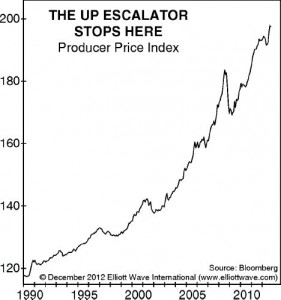Two Signs That Deflation is Far From Over Producer Price Index (PPI) turns south The federal government defines the Producer Price Index (PPI) as "the average change over time in the selling prices received by domestic producers for their output." With help from the Federal Reserve's massive inflationary policies, the PPI has climbed even as the economy began to fall in 2008-09. All the while, the financial media persisted with stories of an economic recovery. EWI analysts offer an independent perspective. The New York Times declares, "Economic Gloom Starting to Lift." Corporate America, however, is not so sure. This chart of producer prices [wave labels removed] probably … [Read more...]
Cost of Living – Fish and Chips
Cost of Living Fish and Chips Fish and chips still remains the favorite take away meal in the UK despite fierce competition. The exact origins are unknown but it has been established that chips arrived from France during the 18th Century. There was also mention of fried fish and bread in ‘Oliver Twist’ by Dickens, published in the 1830s. The Oxford English Dictionary claims the earliest usage of "chips" in this sense was in Charles Dickens' A Tale of Two Cities (published in 1859). Fish and chips became standard fare among the working classes in Great Britain due to the efficiency of trawl fishing in the North Sea, and the development of railways which allowed fresh fish to be rapidly … [Read more...]
Cost of Living
The cost of living or (COL) varies from state to state and city to city and even from neighborhood to neighborhood. Some areas have seen housing costs decrease dramatically in the years since the housing bubble popped in 2008, while others have only fallen slightly. But the Cost of living is more than just housing costs it is the amount of money it will take to maintain the same standard of living in various places. Changes in the COL over time are often calculated via an index such as the CPI index that sets costs at a certain date at 100 and then recalculates costs at intervals. COL calculations are also used to compare the cost of maintaining a certain standard of living in different … [Read more...]
Worried About Inflation – Consider Inflation Indexed Bonds
Inflation-Indexed Bonds (aka i-Bond)- Although inflation is currently low it is still a key concern for investors, because with interest rates at record lows and the FED promising to keep them there for the foreseeable future even a small uptick in inflation can prevent an investor from achieving a real return on investment, as returns on investment fail to beat inflation rates. If a return on investment fails to beat inflation, then in real terms you have not earned any money. You may have a larger figure for your total net worth, but in terms of purchasing power this will earn you less as the costs of living increased at a higher rate. On target Inflation is currently tracking at … [Read more...]
Selling Your Scrap Gold During The Economic Downturn
Selling Your Scrap Gold Economic downturns are a fact of life and you never know when you might be caught up in events outside your control. That is why you always have to be prepared for the circumstances life might throw at you. If during good times you have accumulated some gold either as jewelry or coins, then selling your scrap gold is one such step that you can take when times are rough. There are many advantages of having some gold as an insurance policy against tough times. What is "Scrap Gold"? In its simplest terms, scrap gold is any gold that is sent back to the refiner for recycling. Mostly it is broken jewelry that is no longer needed. Gold coins are rarely melted down … [Read more...]
In 1929, Deflation Started in Europe Before Overtaking the U.S.
Marcus Aurelius was the last of the "Five Good" Roman emperors and is also considered one of the most important members of the Stoic philosophers. He ruled Rome from 161 to 180 AD. He brilliantly said, "Look back over the past, with its changing empires that rose and fell, and you can foresee the future, too." Today we may be seeing the beginning of the end of the American Empire. As Americans we don't like to think of ourselves as having an empire but according to Daniel Larison, The U.S. treats several key regions of the world as privileged space where it is supposed to have military and political supremacy, and regional challengers to that supremacy are treated as potential … [Read more...]
Inflation’s Effect on Retirement Savings
Inflation and Retirement The stock market crash of 2008 may have left you feeling a little nervous about investing your money in the market. The fear of losing everything to another recession or depression has caused many people to make “safer” investment choices, and some people aren’t even investing at all, choosing to place their money in a “high yield” savings account, instead. Unfortunately, "high yield" these days is still lower than the rate of inflation, causing you to actually lose money. Inflation Worse than a Crash Losing your money to inflation is actually much scarier than losing your money to a stock market crash. Stock market crashes are rare, but inflation is inevitable. … [Read more...]
Australia- Iron Ore, Housing and Unemployment
Speculation Mounts Over RBA October Meeting As the RBA heads towards it October meeting, there are a number of important issues on the agenda. The price of iron ore which was one of the major topics of the September meeting have now seen a 26% resurgence in price and the world’s fourth biggest exporter of iron ore, Fortescu Metals, has announced that its US$4.5-billion debt deal will now enable it to refinance any outstanding deals. The central banks in Europe and the United States have announced their intentions to fight off inflation and stimulate asset prices by printing unlimited money while China will be contributing a $150-billion package to the mix. Unemployment Despite … [Read more...]
Why Gold is a Good Investment for Inflationary Times
The Impact of Inflation on Savings If you keep your money in the bank or in money market funds, inflation can eat away at their value. Inflation can be deceiving because your account balances won’t go down. However, when you take your money out to buy something, you might notice that you won’t be able to buy as much as you used to. Therefore, if you don’t put your money into something that keeps up with inflation, you’ll soon find your savings won't buy as much. As an investor, you need to be prepared for the risk of inflation. It happens when there is too much money chasing too few goods, so prices have to go up (because of an increase in the money supply). When the economy is facing … [Read more...]
One Chart Explains Why Government Debt Is Dragging on the Economy
By Dan Steinhart, Casey Research The US has too much debt. This is no longer a controversial statement. Some may believe other problems are more urgent, or that we need to grow our way out rather than slash spending. But even the most spendthrift pundits acknowledge that the debt-to-GDP ratio of the US must decrease if we are to have a stable, prosperous economy. The private sector has reacted to this over-indebted reality as you would expect: by deleveraging. Since 2008, households and businesses have extinguished of 67% of their debt when measured against GDP. Some paid debt down purposefully, and others defaulted. For our purposes, it doesn't matter how the debt went away. Only that … [Read more...]









